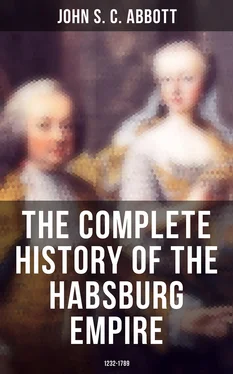The emperor was so overcome with emotion that he could with difficulty pronounce these last words. All were deeply moved; some wept aloud; others, seizing the hand of the emperor and bathing it in tears, vowed allegiance to Albert, and declared that while he lived they would recognize no other sovereign.
The very next day, November, 1437, Sigismond died. Albert and Elizabeth accompanied his remains to Hungary. The Hungarian diet of barons unanimously ratified the wishes of the late king in accepting Albert as his successor. He then hastened to Bohemia, and, notwithstanding a few outbursts of disaffection, was received with great demonstrations of joy by the citizens of Prague, and was crowned in the cathedral.
CHAPTER IV.
ALBERT, LADISLAUS AND FREDERIC.
From 1440 to 1489.
Table of Contents
Increasing Honors of Albert V.—Encroachments of the Turks.—The Christians Routed.—Terror of the Hungarians.—Death of Albert.—Magnanimous Conduct of Albert of Bavaria.—Internal Troubles.—Precocity of Ladislaus.—Fortifications raised by the Turks.—John Capistrun.—Rescue of Belgrade.—The Turks dispersed.—Exultation over the Victory.—Death of Hunniades.—Jealousy of Ladislaus.—His Death.—Brotherly Quarrels.—Devastations by the Turks.—Invasion of Austria.—Repeal of the Compromise.—The Emperor a Fugitive.
The kingdom of Bohemia thus attached to the duchies of Austria contained a population of some three millions, and embraced twenty thousand square miles of territory, being about three times as large as the State of Massachusetts. Hungary was a still more magnificent realm in extent of territory, being nearly five times as large as Bohemia, but inhabited by about the same number of people, widely dispersed. In addition to this sudden and vast accession of power, Albert was chosen Emperor of Germany. This distinguished sovereign displayed as much wisdom and address in administering the affairs of the empire, as in governing his own kingdoms.
The Turks were at this time becoming the terror of Christendom. Originating in a small tribe between the Caspian Sea and the Euxine, they had with bloody cimeters overrun all Asia Minor, and, crossing the Hellespont, had intrenched themselves firmly on the shores of Europe. Crowding on in victorious hosts, armed with the most terrible fanaticism, they had already obtained possession of Bulgaria, Servia, and Bosnia, eastern dependencies of Hungary, and all Europe was trembling in view of their prowess, their ferocity and their apparently exhaustless legions.
Sigismond, beholding the crescent of the Moslem floating over the castles of eastern Hungary, became alarmed for the kingdom, and sent ambassadors from court to court to form a crusade against the invaders. He was eminently successful, and an army of one hundred thousand men was soon collected, composed of the flower of the European nobility. The republics of Venice and Genoa united to supply a fleet. With this powerful armament Sigismond, in person, commenced his march to Constantinople, which city the Turks were besieging, to meet the fleet there. The Turkish sultan himself gathered his troops and advanced to meet Sigismond. The Christian troops were utterly routed, and nearly all put to the sword. The emperor with difficulty escaped. In the confusion of the awful scene of carnage he threw himself unperceived into a small boat, and paddling down the Danube, as its flood swept through an almost uninhabited wilderness, he reached the Black Sea, where he was so fortunate as to find a portion of the fleet, and thus, by a long circuit, he eventually reached his home.
Bajazet, the sultan, returned exultant from this great victory, and resumed the siege of Constantinople, which ere long fell into the hands of the Turks. Amurath, who was sultan at the time of the death of Sigismond, thought the moment propitious for extending his conquests. He immediately, with his legions, overran Servia, a principality nearly the size of the State of Virginia, and containing a million of inhabitants. George, Prince of Servia, retreating before the merciless followers of the false prophet, threw himself with a strong garrison into the fortress of Semendria, and sent an imploring message to Albert for assistance. Servia was separated from Hungary only by the Danube, and it was a matter of infinite moment to Albert that the Turk should not get possession of that province, from which he could make constant forays into Hungary.
Albert hastily collected an army and marched to the banks of the Danube just in time to witness the capture of Semendria and the massacre of its garrison. All Hungary was now in terror. The Turks in overwhelming numbers were firmly intrenched upon the banks of the Danube, and were preparing to cross the river and to supplant the cross with the crescent on all the plains of Hungary. The Hungarian nobles, in crowds, flocked to the standard of Albert, who made herculean exertions to meet and roll back the threatened tide of invasion. Exhausted by unremitting toil, he was taken sick and suddenly died, on a small island of the Danube, on the 17th of October, 1439, in the forty-third year of his age. The death of such a prince, heroic and magnanimous, loving the arts of peace, and yet capable of wielding the energies of war, was an apparent calamity to Europe.
Albert left two daughters, but his queen Elizabeth was expecting, in a few months, to give birth to another child. Every thing was thus involved in confusion, and for a time intrigue and violence ran riot. There were many diverse parties, the rush of armed bands, skirmishes and battles, and all the great matters of state were involved in an inextricable labyrinth of confusion. The queen gave birth to a son, who was baptized by the name of Ladislaus. Elizabeth, anxious to secure the crown of Hungary for her infant, had him solemnly crowned at Alba Regia, by the Archbishop of Gran when the child was but four months old.
But a powerful party arose, opposed to the claims of the infant, and strove by force of arms to place upon the throne Uladislaus, King of Poland and Lithuania, and son of the pagan Jaghellon and the unhappy Hedwige. For two years war between the rival parties desolated the kingdom, when Elizabeth died. Uladislaus now redoubled his endeavors, and finally succeeded in driving the unconscious infant from his hereditary domain, and established himself firmly on the throne of Hungary.
The infant prince was taken to Bohemia. There also he encountered violent opposition. "A child," said his opponents, "can not govern. It will be long before Ladislaus will be capable of assuming the reins of government. Let us choose another sovereign, and when Ladislaus has attained the age of twenty-four we shall see whether he deserves the crown."
This very sensible advice was adopted, and thirteen electors were appointed to choose a sovereign. Their choice fell upon Albert of Bavaria. But he, with a spirit of magnanimity very rare in that age, declared that the crown, of right, belonged to Ladislaus, and that he would not take it from him. They then chose Frederic, Duke of Styria, who, upon the death of Albert, had been chosen emperor. Frederic, incited by the example of Albert, also declined, saying, "I will not rob my relation of his right." But anxious for the peace of the empire, he recommended that they should choose some illustrious Bohemian, to whom they should intrust the regency until Ladislaus became of age, offering himself to assume the guardianship of the young prince.
This judicious advice was accepted, and the Bohemian nobles chose the infant Ladislaus their king. They, however, appointed two regents instead of one. The regents quarreled and headed two hostile parties. Anarchy and civil war desolated the kingdom, with fluctuations of success and discomfiture attending the movements of either party. Thus several years of violence and blood passed on. One of the regents, George Podiebrad, drove his opponent from the realm and assumed regal authority. To legitimate its usurped power he summoned a diet at Pilgram, in 1447, and submitted the following question:
Читать дальше












